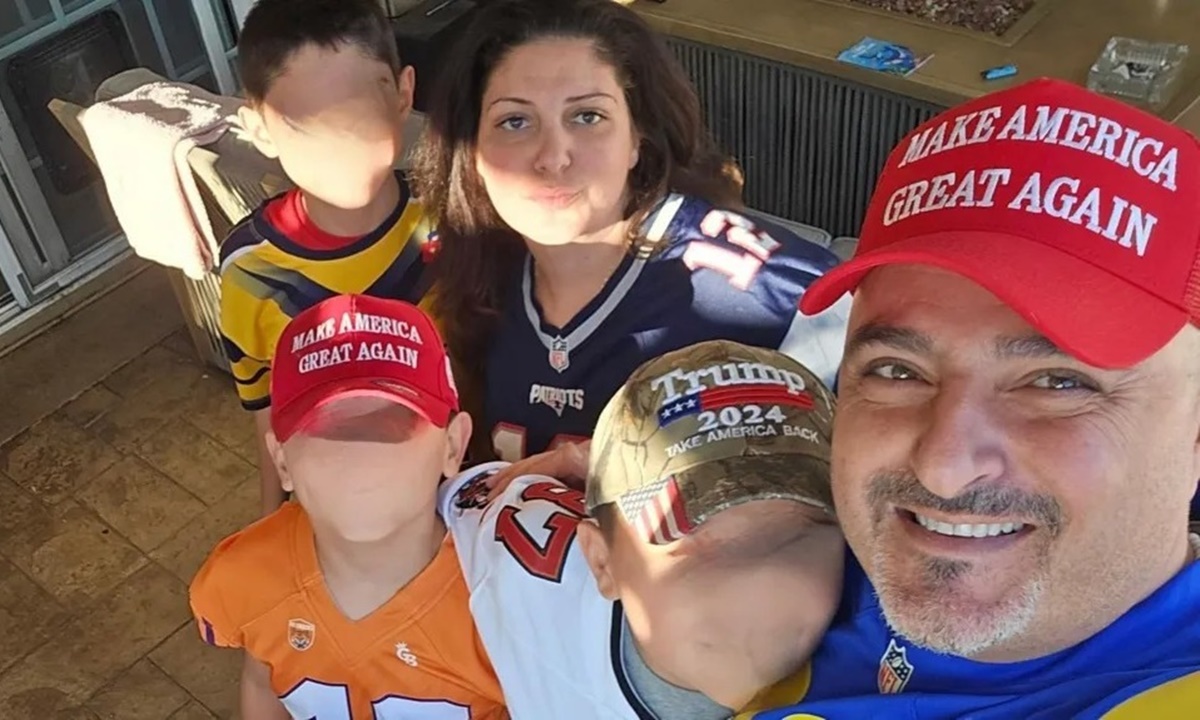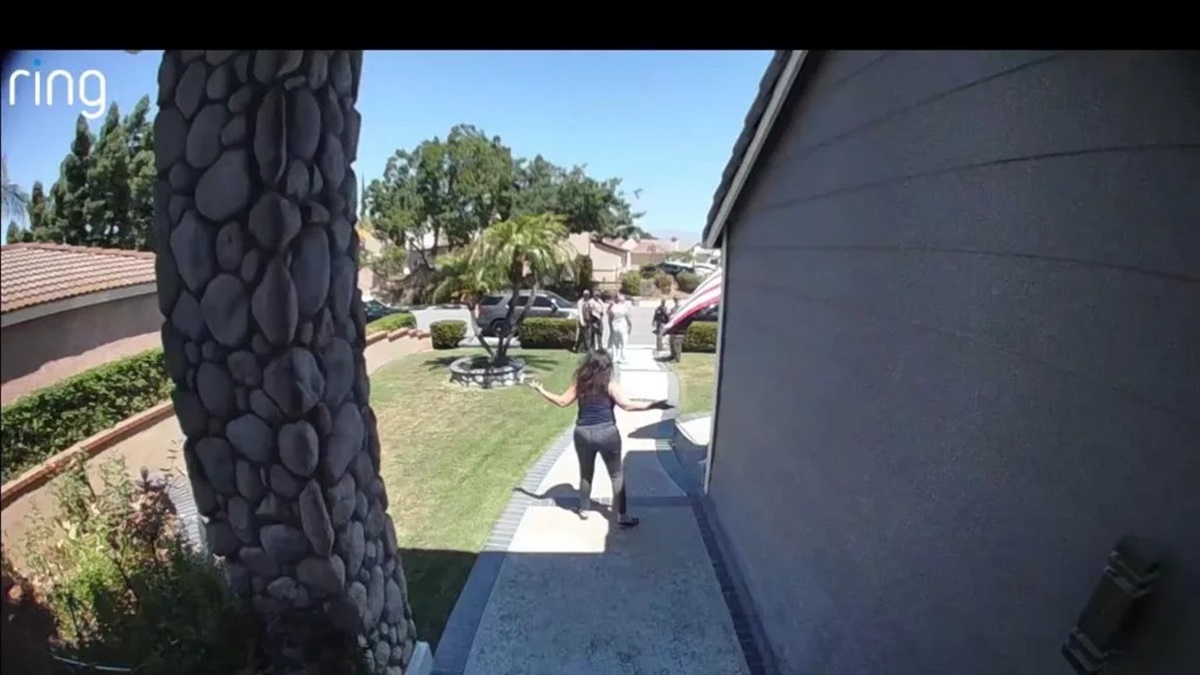"He's doing the right thing because many of these people don't deserve to be here," Arpineh said by phone from the Adelanto Immigration Detention Center in California's Mojave Desert, referring to undocumented immigrants. "I will support President Trump until the end of my life. He's making America great again."
Sixty miles away, at her home in Diamond Bar, an affluent suburb east of Los Angeles County, a Trump flag flies in the front yard. MAGA hats sit on a shelf next to family photo albums.
The house, usually bustling with the laughter of 4 children and three dogs, is now filled with the weary anxiety of Arpineh's husband and mother. "Our home is falling apart," said Arthur Sahakyan, Arpineh's husband.
 |
Arpineh with her husband, Arthur, and three sons. Photo: BBC |
Arpineh with her husband, Arthur, and three sons. Photo: BBC
In many ways, 39-year-old Arpineh embodies the American dream. She exemplifies how the US offers second chances. Arpineh's mother spoke tearfully about her daughter, who has lived in the US since she was three.
Life hasn't always been easy for Arpineh. In 2008, she was convicted of theft and sentenced to two years in prison. This led to the revocation of her green card by an immigration judge. However, because Arpineh is an Iranian of Armenian descent and a Christian (a minority community in Iran), the judge allowed her to remain in the US instead of being deported.
"We are Christians, she can't go back to Iran, no way," Arthur said.
Since her release from prison, Arpineh has rebuilt her life, starting a successful business and raising a family. She is part of a community of hundreds of thousands of Iranian immigrants in Southern California. West Los Angeles, often called Tehrangeles, has the largest Iranian-American population in the US.
Some, like Arpineh, have been detained in recent immigration sweeps, heightening tensions in the city.
Trump's election victory was partly due to his promise of launching the largest deportation program in history, a pledge Arpineh, her husband, and her mother say they still fully support. They believe she will ultimately be released because only dangerous, hardened criminals should be deported.
"I don't blame Trump. I blame Biden," Arthur said. "He opened the border. But I believe in our system. All the good people will be released, and the bad ones will be sent back."
However, while many detainees have no criminal record, Arpineh's prior conviction makes her a high-priority target for deportation.
Arthur said he doesn't know the details of his wife's past theft. They briefly discussed it before marriage, and he dismissed it as a youthful indiscretion. He emphasized her good deeds over the past 17 years, like volunteering for the local school district and supporting firefighters and police officers with food.
"We all make mistakes," he said.
So, when Immigration and Customs Enforcement (ICE) called Arpineh on 30/6 during breakfast, they thought it was a prank.
Thirty minutes later, ICE agents arrived at their home.
Despite Los Angeles's lenient immigration policies urging residents to "know their rights" and not open the door to ICE, the couple went outside to speak with the agents.
Arpineh explained that a judge had allowed her to stay in the US due to the situation in Iran, provided she didn't commit any further crimes and regularly reported to immigration officials. She showed documentation of her last check-in in April.
Arthur said he even invited the agents inside, but they refused. They told Arpineh the situation had changed, and they had a warrant for her arrest.
The agents allowed her to go inside and say goodbye to her 4 children. They warned that even if she didn't come out, they would still apprehend her.
"They told us they would get her anyway, maybe while she was driving with the kids. We thought about what we'd seen on the news: stun grenades, cars being cornered," Arthur said. They didn't want to risk a violent arrest, especially in front of their children.
"My wife went in to kiss the kids goodbye," he recalled. "She walked out onto the porch with her head held high and said, 'Here I am.'"
Arthur asked the officers not to handcuff his wife in front of their children. They said it wasn't possible but agreed to do it out of sight.
"I knew the kids were watching from upstairs," he said. "I didn't want them to see their mother in handcuffs."
Arpineh was taken to a federal building in downtown Los Angeles, used by ICE to process detainees. This building has been the focus of anti-ICE protests that have roiled Los Angeles for weeks.
Arpineh said detainees were "treated like animals." She spent three days in a cold, brightly lit room with 28 other women, subsisting on snacks and a single bottle of water per day. They huddled together for warmth and slept on the floor.
 |
Arpineh speaks with ICE agents outside her home before her arrest. Photo: BBC |
Arpineh speaks with ICE agents outside her home before her arrest. Photo: BBC
Speaking Armenian, Spanish, and English, Arpineh communicated with the other women, offering support and encouragement.
Three days later, she was transferred to Adelanto, a privately run detention center northeast of Los Angeles, known for its harsh conditions.
Arpineh said conditions there were better than in Los Angeles. She now receives three meals a day, has access to showers, and a bed. Although she's heard that access to medical treatment is difficult, she isn't overly worried, considering herself young and healthy.
"But it's still challenging," she said.
Arpineh and her husband maintain their faith in the Trump administration and hope for her release. "I can't be deported to any country," she said from the detention center.
In February, a group of Iranian Christians was deported after crossing the border from Mexico. However, they were sent to Panama, not Iran.
While hopeful, Arpineh admits to moments of discouragement. She loves America and considers herself American, despite lacking full documentation.
She calls her husband hourly with updates, though there's little new information. Arthur says their children don't fully understand what's happening. Their 4-year-old daughter keeps asking when her mother will come home.
All 4 children are US citizens, born and raised in California. The couple hopes officials will consider this when deciding Arpineh's fate.
"I have 4 American children. I own a business. I have property. I have a car," Arpineh said. "I haven't done anything wrong for many years."
Vu Hoang (BBC, AFP, Reuters)












